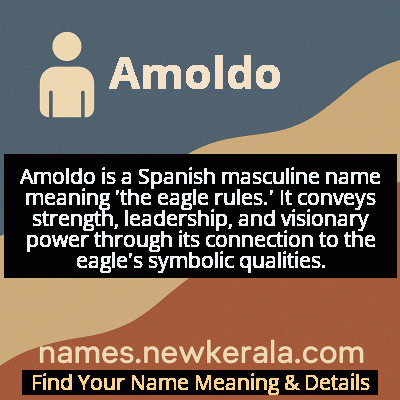Amoldo Name Meaning & Details
Origin, Popularity, Numerology Analysis & Name Meaning of Amoldo
Discover the origin, meaning, and cultural significance of the name AMOLDO. Delve into its historical roots and explore the lasting impact it has had on communities and traditions.
Name
Amoldo
Gender
Male
Origin
Spanish
Lucky Number
6
Meaning of the Name - Amoldo
Amoldo is a Spanish masculine name meaning 'the eagle rules.' It conveys strength, leadership, and visionary power through its connection to the eagle's symbolic qualities.
Amoldo - Complete Numerology Analysis
Your Numerology Number
Based on Pythagorean Numerology System
Ruling Planet
Venus
Positive Nature
Harmonious, responsible, caring, and artistic.
Negative Traits
Overly idealistic, superficial, possessive, or jealous.
Lucky Colours
Pink, turquoise.
Lucky Days
Friday.
Lucky Stones
Diamond, turquoise.
Harmony Numbers
2, 3, 9.
Best Suited Professions
Artists, musicians, teachers, healthcare workers.
What People Like About You
Warmth, nurturing nature, artistic flair.
Famous People Named Amoldo
Amoldo Rodríguez
Military Commander
Led Spanish colonial forces in strategic campaigns across South America
Amoldo de la Cruz
Architect
Designed several prominent cathedrals and government buildings in colonial Mexico
Amoldo Martínez
Poet and Writer
Authored influential works blending Spanish literary traditions with indigenous themes
Amoldo Vargas
Educator and Philosopher
Founded educational institutions promoting Spanish cultural heritage in Latin America
Name Variations & International Equivalents
Click on blue names to explore their detailed meanings. Gray names with will be available soon.
Cultural & Historical Significance
The name's cultural significance extends beyond Spain to Latin American countries where Spanish colonial influence remains strong. In these regions, Amoldo often appears in families with historical ties to Spanish administration or land ownership, serving as a marker of social status and heritage. The name's persistence in certain communities reflects ongoing cultural connections to Spanish traditions, even as naming trends have evolved. In contemporary cultural contexts, Amoldo represents a link to a specific historical moment when Spanish power and influence were at their peak, making it a name that carries both personal identity and collective historical memory for Spanish-speaking communities worldwide.
Extended Personality Analysis
Individuals named Amoldo are typically perceived as natural leaders with strong decision-making capabilities and strategic minds. They often exhibit the eagle-like qualities suggested by their name's meaning—keen observation, high aspirations, and the ability to see situations from a broader perspective. These men tend to be ambitious yet calculated, preferring to plan their moves carefully rather than acting impulsively. Their leadership style often combines traditional values with innovative thinking, making them effective in both conservative and progressive environments. Amoldos are known for their loyalty to family and tradition, often serving as pillars in their communities while maintaining a certain dignified reserve that commands respect.
Beyond their leadership qualities, Amoldos typically demonstrate strong organizational skills and a methodical approach to problem-solving. They value structure and order, often excelling in fields that require long-term planning and systematic execution. While they can appear serious or formal in professional settings, those who know them well often describe a dry wit and deep loyalty to close friends and family. Their challenge often lies in balancing their natural authority with emotional accessibility, as their focus on responsibility and achievement can sometimes create distance in personal relationships. However, when they learn to combine their strategic vision with emotional intelligence, Amoldos become exceptionally effective leaders who inspire both respect and genuine affection from those around them.
Modern Usage & Popularity
In contemporary times, Amoldo has become a relatively rare name, primarily used in traditional Spanish-speaking families who value historical and cultural continuity. While it experienced moderate popularity in the early 20th century, particularly in Spain and former colonial regions, its usage has declined significantly in recent decades. The name is now considered somewhat old-fashioned, though it maintains a niche appeal among families with strong connections to Spanish heritage or those seeking distinctive traditional names. In modern Hispanic communities, it's occasionally revived as a middle name to honor family traditions while giving children more contemporary first names. The name's decline reflects broader trends away from formal, traditional names toward shorter, more international options, though it occasionally sees small resurgences during periods of renewed interest in historical and cultural preservation.
Symbolic & Spiritual Meanings
The name Amoldo carries profound symbolic weight through its connection to the eagle, representing vision, power, and sovereignty across multiple cultural contexts. In Spanish tradition, the eagle symbolizes not only royal authority and divine protection but also the ability to transcend ordinary limitations and perceive higher truths. The concept of 'ruling' in the name's meaning extends beyond political power to include self-mastery, moral authority, and the capacity to guide others through wisdom rather than force. Symbolically, Amoldo represents the ideal of enlightened leadership—combining the eagle's panoramic vision with the responsibility of governance. This dual symbolism makes the name particularly significant in contexts where leadership requires both strategic insight and ethical grounding, embodying the balance between power and wisdom that defines truly effective authority and making it a name that suggests both capability and character.

